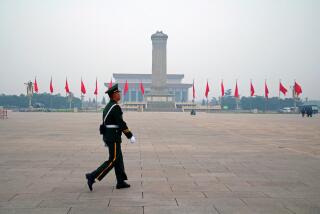Former Chinese security czar Zhou Yongkang is under arrest
- Share via
Reporting from Beijing — After more than a year of intense speculation and secret investigation, China’s ruling Communist Party on Friday expelled former domestic security czar Zhou Yongkang, accusing him of misdeeds including accepting bribes, disclosing state secrets and sexual improprieties.
Zhou has been arrested, the state-run New China News Agency reported, and his case will be handed over to judicial authorities for prosecution.
Zhou retired as a member of the Politburo Standing Committee, the highest body in the Communist Party, in 2012, just as Xi Jinping was elevated to party general secretary. Xi became president in March 2013.
If formal charges are filed, Zhou will become the highest-ranking Chinese official to be prosecuted since the 1970s. Standing committee members, past and present, have enjoyed an informal immunity from prosecution since then.
Zhou “deviated from the party’s nature” and committed a “serious breach of discipline,” and the effect of his behavior on the party and the people was “extremely bad,” the news agency reported.
Zhou, 72, was long loathed and feared by Chinese liberals, who accused him of excesses against dissidents. He also was widely believed to have fostered rampant corruption in the state oil sector, where he was an official early in his career. Xi is in the midst of a far-reaching anti-graft campaign and has vowed to ensnare both “tigers and flies,” i.e., officials of both high and low rank.
But many believed a power struggle at the apex of the Communist Party led to Zhou’s downfall. He was part of a political faction posing a serious rivalry to Xi.
The group also included ex-President Jiang Zemin and former Chongqing party secretary Bo Xilai, who was convicted last year of bribery, embezzlement and abuse of power and sentenced to life in prison.
“This is an old pattern in Chinese Communist politics. It was essentially the same during the Mao Tse-tung years. A rule, like ‘no corruption,’ is applied selectively to bring down the rival of a power-holder,” said Perry Link, a sinologist at UC Riverside. “The claim that this is done ‘in accordance with law’ is necessary because the regime, for reasons of its own prestige and power, needs to pretend that it is behaving objectively on universal principles. What is actually going on is much closer to Mafia-style internecine struggle.”
During Bo’s trial, testimony emerged that the domestic security apparatus, then under Zhou’s control, had tried to cover up the killing by Bo’s wife of a British national, Neil Heywood, with whom she had a business dispute. Some claimed that Zhou’s attempts to shield Bo, one of his proteges, amounted to insubordination, or even constituted an attempted coup against the leadership.
The Communist Party’s investigation of Zhou has been conducted out of the public eye, and his name had been essentially off-limits in Chinese media for months.
Reports in overseas Chinese media said the investigation of Zhou began as early as August 2013. The New China News Agency reported early Saturday that the Politburo Standing Committee had heard a report on his case in December 2013 and reviewed the investigation by the party’s Central Commission for Discipline Inspection in July.
Under Chinese procedure, party officials are first investigated internally by the commission and a decision can be made not to proceed with public charges. But the latest announcement indicates that Zhou will get his day in court.
Speculation began to mount as early as a year ago that Zhou would be charged.
Follow @JulieMakLAT for news from China
More to Read
Sign up for Essential California
The most important California stories and recommendations in your inbox every morning.
You may occasionally receive promotional content from the Los Angeles Times.











